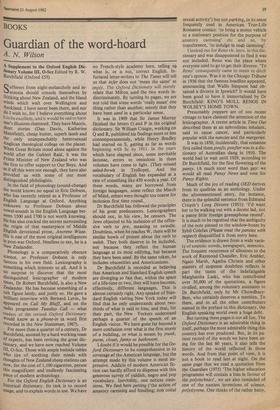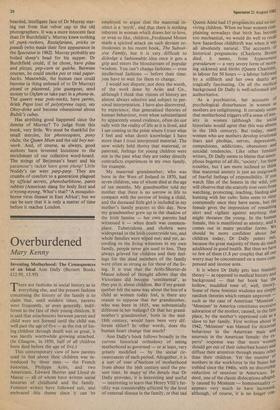BOOKS
Guardian of the word-hoard
A. N. Wilson A Supplement to the Oxford English Dic- tionary Volume III, O-Scz Edited by R. W. Burchfield (Oxford £55) Sufferers from night-melancholy and in- somnia should console themselves by thinking about New Zealand, and the bland winds which waft over Wellington and Auckland. I have never been there, and nor do I wish to, for I believe everything about It to be excellent, and it would be sad to have one's illusions shattered. They have Maoris, short stories (Dan Davin, Katherine Mansfield), cheap butter, superb lamb and the only unimpeachably heterosexual Anglican theological college on the planet. When Great Britain stood alone against the world after the Galtieri Raid, it was the Prime Minister of New Zealand who was the first to offer support to Our Boys. And as if all this were not enough, they have also Provided us with some of our most distinguished philologists.
In the field of phonology (sound-change) the world knows no equal to Eric Dobson, who has recently retired as a Professor of English Language at Oxford. Anything unknown to Professor Dobson about vowel-sounds in the English Language bet- ween 1500 and 1700 is not worth knowing. He has also cracked the secrets surrounding the origin of that masterpiece of Middle Ehglish devotional prose, Ancrene Wisse. His is one of the most original intelligences in Post-war Oxford. Needless to say, he is a New Zealander.
Phonology is a comparatively obscure science, so Professor Dobson is only famous in his own field. Lexicography is something which interests us all. And it is no surprise to discover that the most distinguished lexicographer of modern times, Dr Robert Burchfield, is also a New Zealander. He has become something of a Cult figure lately, and justly so. He gave a brilliant interview with Bernard Levin, he appeared on Call My Bluff, and on the radio programme Tuesday Call — what readers of the revised Oxford Dictionary would know as a phone-in (a word first recorded in the New Statesman, 1967).
For more than a quarter of a century, Dr Burchfield, assisted by a hard working team of experts, has been revising the great dic- tionary, and we have now reached Volume 11j, O-Scz. Those with ample bedside tables Who tire of soothing their minds with thoughts of New Zealand sheep stations can now, for the cost of 1,100 cigarettes, peruse
• this magnificent and endlessly fascinating Piece of modern archaeology.
For the Oxford English Dictionary is an historical dictionary. Its task is to record usage, and to explain words in use. We have
no French-style academy here, telling I* what is, or is not, correct English. In-
furiated letter-writers to The Times will tell us that infer does not 'mean the same' as imply. The Oxford Dictionary will merely
relate that Milton used the two words in- discriminately. By turning its pages, we are
not told that some words 'really mean' one thing rather than another; merely that they have been used in a particular sense.
It was in 1909 that Sir James Murray finished the letters 0 and P in the original dictionary. Sir William Craigie, working on Q and R, published his findings more or less contemporaneously, while Henry Bradley had started on S, getting as far as words beginning with Sc by 1911. In the years which have elapsed since, some inevitable lacunae, errors or omissions in these volumes have come to light. (They missed salad-bowls in Trollope). And the vocabulary of English has expanded at a rate of something like 450 words a year. Of these words, many are borrowed from foreign languages, some reflect the March of Mind, others were thought too coarse for inclusion first time round.
Dr Burchfield has followed the principles of his great predecessors. Lexicographers should not, in his view, be censors. The Jews objected to his inclusion of the offen- sive verb to jew, meaning to swindle. Doubtless, when he reaches W, there will be similar howls of protest about the verb to welsh. They both deserve to be included, not because they reflect the human language at its most edifying, but because they have been used. By the same token, he includes obscenities and Americanisms.
Dr Burchfield is recorded as believing that American and Standard English speech are diverging so fast that, within the space of a life-time or two, they will have become, effectively, different languages. This is almost certainly right. Any speaker of Stan- dard English visiting New York today will find that he only understands about two- thirds of what is said to him; and that, for their part, the New Yorkers understand perhaps a quarter of the speech of an English visitor. We have gone far beyond a mere confusion over what is the first storey of a building, or what is meant by trunk, purse, closet, fanny or bathroom.
I doubt if it would be possible for the Ox- ford Dictionary to be comprehensive in its coverage of the American language, but the attempt made by this volume is most im- pressive. Addicts of modern American fic- tion can hardly afford to dispense with this generous survey of yiddish, negro and pop vocabulary. Inevitably, one notices omis- sions. We find here petting (`the action of amatory caressing and fondling; non coital sexual activity') but not parking, in its sense frequently used in American True-Life
Romance comics: `to bring a motor vehicle to a stationary position for the purpose of amatory caressing' etc and so, by
transference, `to indulge in stiGh caressing'. I looked out for Reno vb. intrs. in this dic- tionary and was disappointed to find it was not included. Reno was the place where everyone used to go to get their divorce. `To Reno' consequently came to mean to ditch one's spouse. Was it in the Chicago Tribune in 1936 that the famous headline appeared, announcing that Wallis Simpson had ob- tained a divorce in Ipswich? It would have been good to have it immortalised by Dr Burchfield: KING'S MOLL RENOS IN WOLSEY'S HOME TOWN.
Presumably poppers are of too recent vintage to have claimed the attention of the lexicographer. A recent article in Time Out described them as an aphrodisiac inhalant, said to cause cancer, and particularly popular with the nancies and the margeries.
It was in 1850, incidentally, that someone first called them poofs; poofter was in a dic- tionary of Australian slang in 1910. The world had to wait until 1929, according to Dr Burchfield, for the first flowering of the pansy. (A much nicer word than gay: we would all read Pansy News and vote for Pansy Rights.
Much of the joy of reading OED derives from its qualities as an anthology. Under the aforementioned entry, for instance, there is the splendid sentence from Edmund Crispin's Long Divorce (1951): 'I'd want her to be walking out with a decent lad, not a pansy little foreign gramaphone record'. It is much to be regretted that the ambiguity of the note pinned to the window-boxes by Sybil Colefax (Please treat the pansies with respect) disqualified it from entry here.
The evidence is drawn from a wide varie- ty of sources: novels, newspapers, memoirs. The frequent recurrence of allusions to the work of Raymond Chandler, Eric Ambler, Ngaio Marsh, Agatha Christie and other masters of suspense doubtless reflects in part the tastes of the indefatigable Marghanita Laski, who has contributed over 30,000 of the quotations, a figure rivalled, among the voluntary assistants to Dr Burchfield, only by Mr Chowdhary- Best, who certainly deserves a mention. To them, and to all the other contributors named in the preface to this dictionary, the English-speaking world owes a huge debt.
But turning these pages is not all fun. The Oxford Dictionary is an admirable thing in itself, perhaps the most admirable thing this country has ever produced. But, in its pa- tient record of the words we have been us- ing for the last 60 years, it also tells the history of the world reflected in those words. And from that point of view, it is not a book to read late at night. On the same page that we read a quotation from the Guardian (1975) 'The higher education programme will contain a bias in favour of the polytechnics', we are also reminded of one of the nastiest inventions of science, polystyrene. One thinks of the rather batty, bearded, intelligent face of Dr Murray star- ing out from that velvet cap to the old photographers. It was a more innocent face than Dr Burchfield's. Murray knew nothing of punk-rockers, Rastafarians, pricks or pseuds (who made their first appearance in the Spectator in 1962). Murray probably ate boiled sheep's head for his supper. Dr Burchfield could, if he chose, have pilau and pizzas, pop-corn or quiche. Between courses, he could smoke pot or read paper- backs. Meanwhile, the human race could become (a thing unheard of to Dr Murray) pissed or plastered, join quangoes, send money to Oxfam or take part in a phone-in. The queers wear polo-necks, have perms, drink Pepsi (out of polystyrene cups), say Okey-doke and become obsessional about Rubik's cubes.
Has anything good happened since the demise of Murray? To judge from this book, very little. We must be thankful for small mercies, for photocopiers, pony clubs, the Queen Mum and the old boy net- work. And, of course, as always, good authors have invented locutions to the enrichment of our collective word-hoard. The strings of Betjeman's heart and his paramour's racket have gone plung! Little Noddy's car went parp-parp. They are crumbs of comfort to a generation plagued by official secrets, phenobarbitone, pants rabbits (American slang for body lice) and o'nyong-nyong. What's that? 'A mosquito- borne virus disease in East Africa'; but we can be sure that it is only a matter of time before it reaches London.



































 Previous page
Previous page